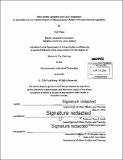| dc.description.abstract | The Smart Growth Zoning Overlay District Act (M.G.L. Chapter 40R, the Legislation) was issued in March 2005 with the mission to substantially increase the supply of housing, especially for low- and moderate-income households, and to incentivize Smart Growth land development patterns. Municipalities participate in this program by voluntarily adopting a Smart Growth zoning district in their local zoning ordinance/by-laws which allows dense housing development as-of-right. Participating municipalities will receive a Zoning Incentive Payment upon creating the district, based on the additional number of housing units allowed as-of-right under 40R compared with base zoning, and a Density Bonus Payment for each new unit built in the district. They will also have priority when competing for other state discretionary subsidies. As of December 2013, thirty-three 40R Smart Growth Overlay Districts (40R District) have been approved in thirty-two Massachusetts communities, with an aggregate area of 1,436 acres, and a total number of 12,350 Future Zoned Units; another three 40R districts are pending or under review. Ten 40R Districts have projects (or project phases) that have been built and put into use. This study aims to give a diagnostic evaluation on the current and potential effectiveness of the Legislation in achieving the goals of facilitating quality housing production and promoting Smart Growth. The evaluation is set in the context of housing development and land planning in Massachusetts, which is also the background of the Legislation, and based on four 40R cases from four different municipalities, each of which has adopted local zoning ordinance/by-laws, created a 40R district, and completed development under 40R. In each case, the Smart Growth qualities of the development are evaluated against a set of qualitative criteria developed from the Smart Growth principles outlined in the Legislation, with reference to prevailing Smart Growth standards used in the profession and feedback from 40R's implementers. The role of 40R in leading to these development results are then analyzed, which highlights the prospect of 40R's application and impact in the future. The main conclusions are: Generally speaking, 40R plays an important role in helping communities achieve their own vision of Smart Growth and housing production by resolving the site, financial, or other development obstacles that are imbedded in the local development context and base zoning. This success is achieved through incentive-based stakeholder cooperation, an indispensable part of the entire 40R zoning and (project) permitting process. Also, the Legislation provides a very general and broad description of Smart Growth principles, and therefore each community may interpret and define Smart Growth standards according to local needs. Being flexible, adaptable and context-sensitive is key to creating opportunities where various stakeholders find common interests in establishing partnerships around 40R. Moreover, when used appropriately, 40R as a zoning tool, could potentially have larger impacts in facilitating Smart Growth and housing production over a longer period than other policies that are based on a single project. However, in some cases, being flexible and sensitive to local context seems to have gone too far, and as a result, offset some of the benefits promised by 40R, such as housing being in close proximity to jobs and amenities, streamlining the permitting process, etc. The reasons for this drawback come from both 40R itself and the context in which 40R operates. Some requirements of 40R are too vague and allow a zoning district or project to gain 40R status and incentive payments even though it fails to meet most of the Smart Growth principles outlined in the Legislation. The recent amendment to the 40R Regulations tries to solve this problem by setting more straightforward and explicit requirements; the results of these changes remain to be seen. In terms of barriers, there are general concerns about and oppositions to Smart Growth from the neighborhood, local government, and development community, who tend to use their power as stakeholders to resist Smart Growth policies. They are particularly resistant to a zoning policy like 40R for fear that it will allow Smart Growth types of development as-of-right. The home-rule tradition and a lack of regional planning for Smart Growth land use further weaken the legislative and regulatory foundations of 40R. 40R has limited leverage to overcome these context barriers; its effectiveness in facilitating Smart Growth will remain confined by the development context at least in the near future. Key words: Smart Growth, Zoning, Chapter 40R, Massachusetts. | en_US |
